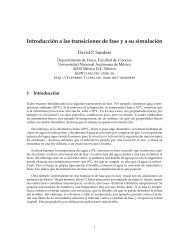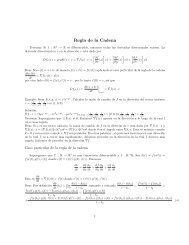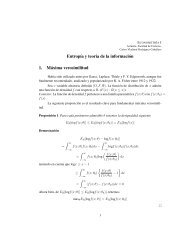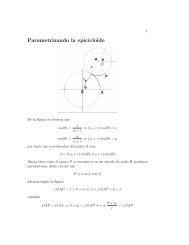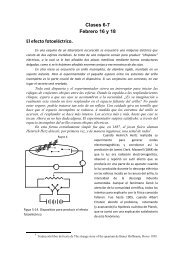"Surely You're Joking, Mr. Feynman!" - unam.
"Surely You're Joking, Mr. Feynman!" - unam.
"Surely You're Joking, Mr. Feynman!" - unam.
You also want an ePaper? Increase the reach of your titles
YUMPU automatically turns print PDFs into web optimized ePapers that Google loves.
saying. But every time you get up to ask a question or to say something, I understand<br />
exactly what you mean what the question is, and what you're saying so I thought you<br />
can't be a professor!"<br />
There was a special dinner at some point, and the head of the theology place, a<br />
very nice, very Jewish man, gave a speech. It was a good speech, and he was a very good<br />
speaker, so while it sounds crazy now, when I'm telling about it, at that time his main<br />
idea sounded completely obvious and true. He talked about the big differences in the<br />
welfare of various countries, which cause jealousy, which leads to conflict, and now that<br />
we have atomic weapons, any war and we're doomed, so therefore the right way out is to<br />
strive for peace by making sure there are no great differences from place to place, and<br />
since we have so much in the United States, we should give up nearly everything to the<br />
other countries until we're all even. Everybody was listening to this, and we were all full<br />
of sacrificial feeling, and all thinking we ought to do this. But I came back to my senses<br />
on the way home.<br />
The next day one of the guys in our group said, "I think that speech last night was<br />
so good that we should all endorse it, and it should be the summary of our conference."<br />
I started to say that the idea of distributing everything evenly is based on a theory<br />
that there's only X amount of stuff in the world, that somehow we took it away from the<br />
poorer countries in the first place, and therefore we should give it back to them. But this<br />
theory doesn't take into account the real reason for the differences between countries <br />
that is, the development of new techniques for growing food, the development of<br />
machinery to grow food and to do other things, and the fact that all this machinery<br />
requires the concentration of capital. It isn't the stuff, but the power to make the stuff, that<br />
is important. But I realize now that these people were not in science; they didn't<br />
understand it. They didn't understand technology; they didn't understand their time.<br />
The conference made me so nervous that a girl I knew in New York had to calm<br />
me down. "Look," she said, "you're shaking! You've gone absolutely nuts! Just take it<br />
easy, and don't take it so seriously. Back away a minute and look at what it is." So I<br />
thought about the conference, how crazy it was, and it wasn't so bad. But if someone<br />
were to ask me to participate in something like that again, I'd shy away from it like mad <br />
I mean zero! No! Absolutely not! And I still get invitations for this kind of thing today.<br />
When it came time to evaluate the conference at the end, the others told how<br />
much they got out of it, how successful it was, and so on. When they asked me, I said,<br />
"This conference was worse than a Rorschach test: There's a meaningless inkblot, and the<br />
others ask you what you think you see, but when you tell them, they start arguing with<br />
you!"<br />
Even worse, at the end of the conference they were going to have another<br />
meeting, but this time the public would come, and the guy in charge of our group has the<br />
nerve to say that since we've worked out so much, there won't be any time for public<br />
discussion, so we'll just tell the public all the things we've worked out. My eyes bugged<br />
out: I didn't think we had worked out a damn thing!<br />
Finally, when we were discussing the question of whether we had developed a<br />
way of having a dialogue among people of different disciplines our second basic<br />
"problem" I said that I noticed something interesting. Each of us talked about what we<br />
thought the "ethics of equality" was, from our own point of view, without paying any<br />
attention to the other guy's point of view. For example, the historian proposed that the



